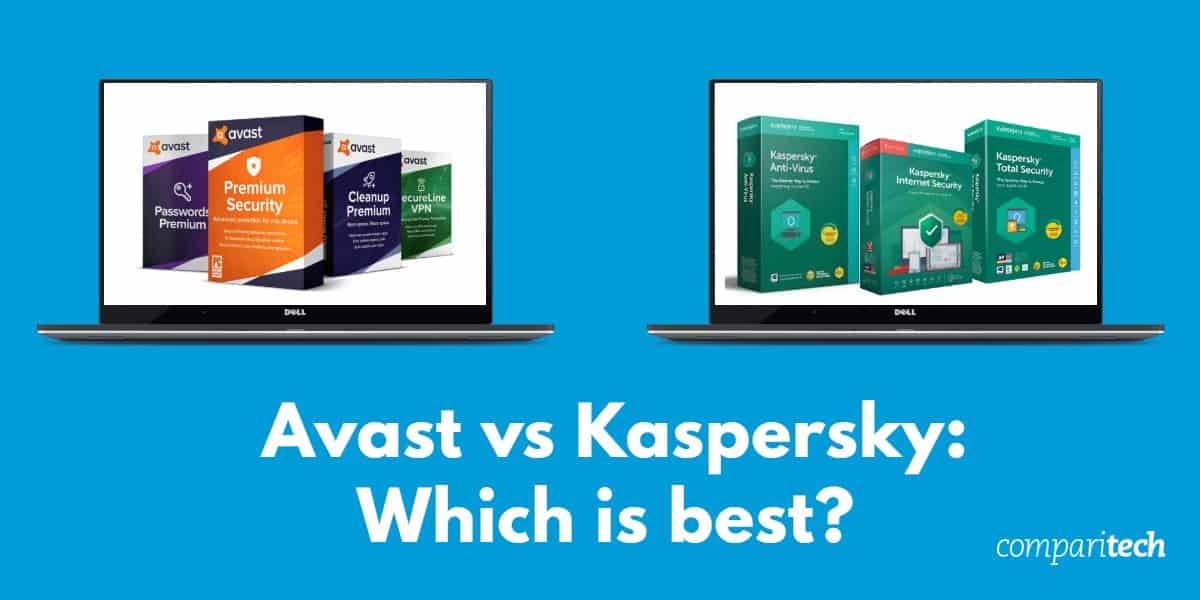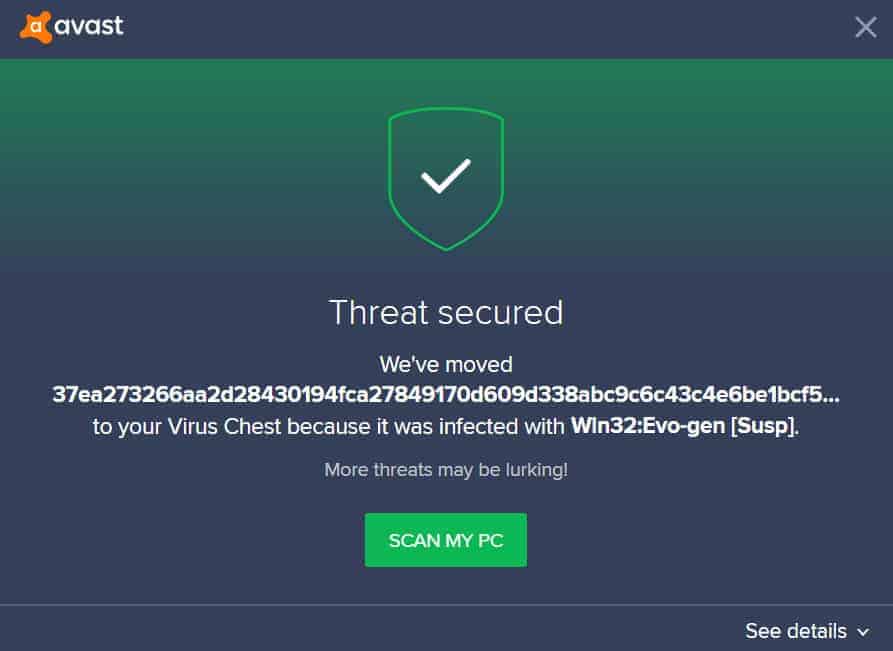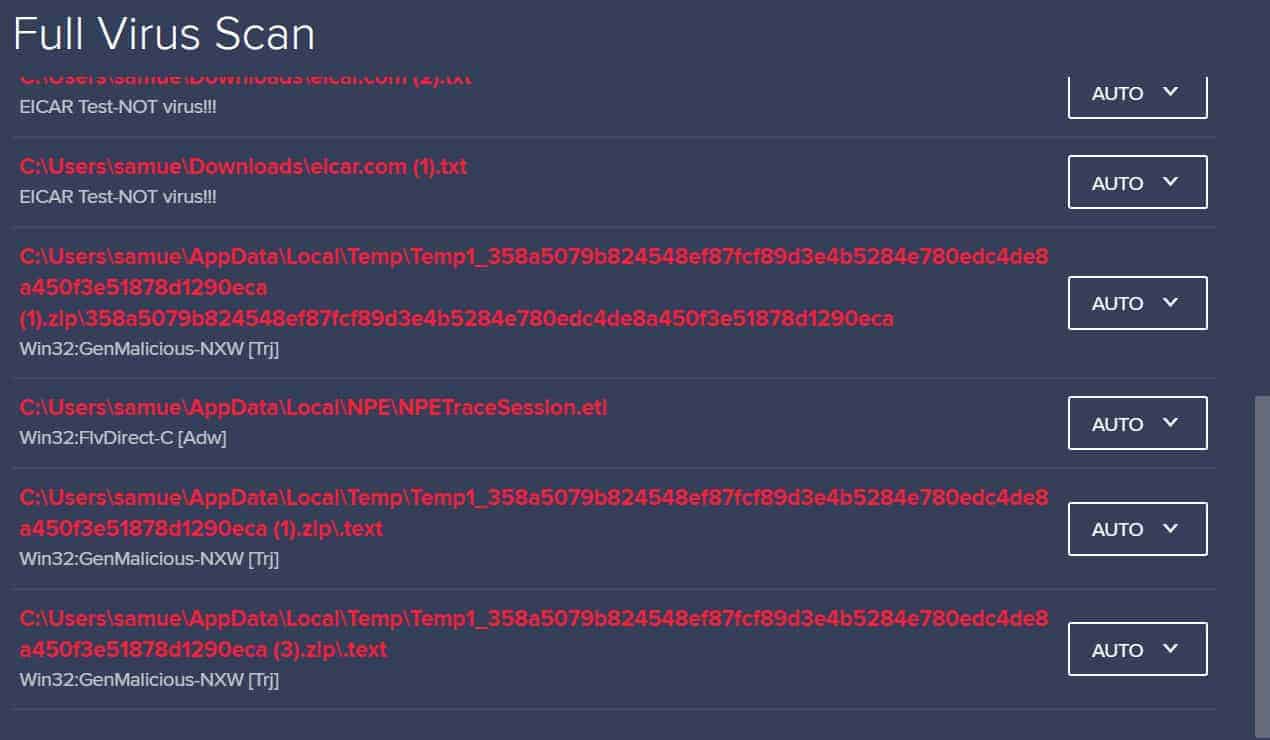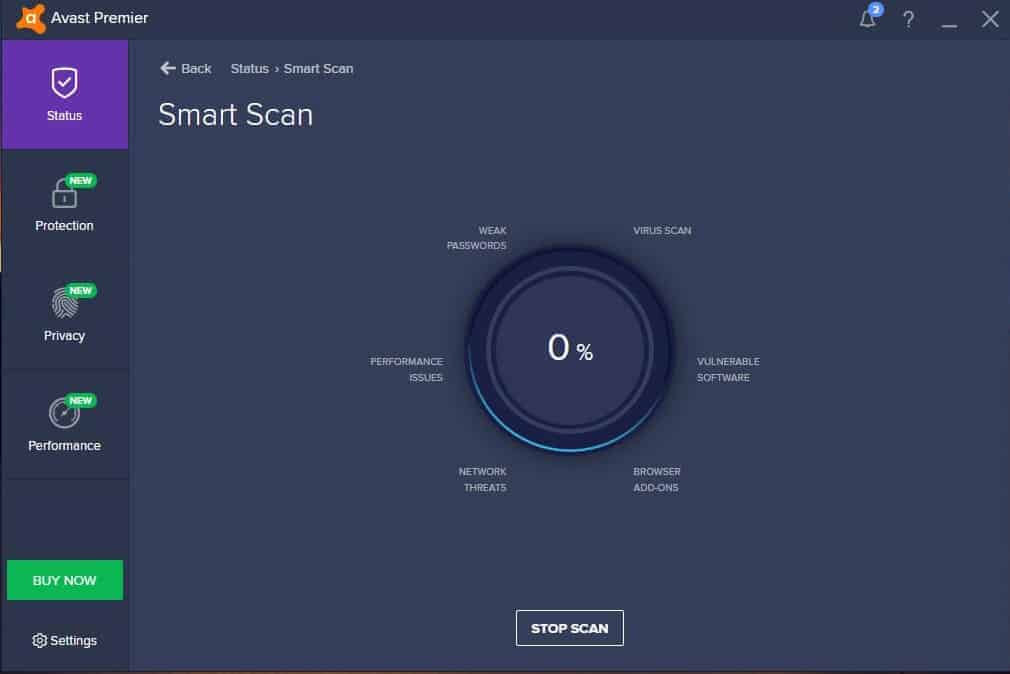
Avast vs Kaspersky – are their products really all they are cracked up to be? Which one is going to do the best job at protecting your PC or Mac? There’s only one way to find out…
I will use both my own in house malware detection tests as well as some independent research from the top antivirus labs running independent tests. You can read more about our testing methodology towards the end of this article.
We’ll look at similar product lines from both Avast and Kaspersky—Kaspersky Total Security and Avast Premium Security—to see which one offers the best value for money and security.
If you don’t have enough time to read the full comparison, here is the quick version. Kaspersky is my top choice because of its excellent malware protection, good value for money, and useful additional features such as banking protection and file backup.
Summary: Avast vs Kaspersky
Avast has 425 million active users, making it one of the most popular and well-known antivirus programs on the market today. Avast is from the Czech Republic and has over 1700 employees. However, Avast has come under fire recently after a news story highlighted that Avast collected and sold user data.
In 2016, Avast acquired antivirus company AVG. Over the last few years, Avast and AVG have combined the backend of their products, their detection methods, behavior blocking and cloud, to offer the same level of protection with different packages and interfaces. In August 2021, Norton announced it would be acquiring Avast antivirus. As of the time of writing, Avast and Norton products remain separate. However, in the future, Avast and Norton’s detection capabilities could be combined to create a much more powerful security suite, as they are both market leaders. Norton also acquired antivirus company Avira in July 2020.
Kaspersky operates in 200 countries and has 400 million users. It helps 250,000 corporate clients with their cybersecurity. It was founded in Russia in 1997. The company’s portfolio includes leading endpoint protection and services to fight sophisticated digital threats. However, Kaspersky also comes with some controversy, as some cybersecurity experts are wary of the alleged links with the Russian government.
Summary of features
| Feature | Kaspersky Total Security | Avast Premium Security |
|---|---|---|
| Antivirus and Antispyware |  |
 |
| Firewall |  |
 |
| Webcam Protection |  |
 |
| Password Manager |  |
 |
| Anti-Phishing |  |
 |
| Ransomware protection |  |
 |
| Banking and Payment Protection |  |
 |
| Parental Control |  |
 |
| Network Attack Protection |  |
 |
| Encrypted storage |  |
 |
| Automatically update apps |  |
 |
| VPN |  |
 |
| PC Cloud backup |  (On PC) (On PC) |
 |
| File Shredder |  |
 |
| Performance optimization |  |
 |
| Identity theft protection |  |
 |
| Run suspicious apps in sandbox |  |
 |
| File Backup |  |
 (On PC) (On PC) |
Pricing & Compatibility
As the table below shows, both Avast and Kaspersky are similar in their price points. Both programs offer free antivirus protection in Avast’s Free Antivirus and Kaspersky’s Security Cloud. Although both are basic, they entice customers to sign up and try before buying into a more advanced program. Both pricing structures are simple and their top tier plans offer protection for multiple devices. Avast Premium Security protects up to ten devices and Kaspersky Total Security protects up to five, and you can increase the number of devices for an additional fee.
| Kaspersky Security Cloud | Kaspersky Antivirus | Kaspersky Internet Security | Kaspersky Security Cloud | Kaspersky Total Security - 5 devices |
|---|---|---|---|---|
| Free | $59.99 / year | $79.99 / year | $89.99 / year | $99.99 / year |
| Avast Free Antivirus | Avast Premium Security 1 PC | Avast Premium Security - 1 Mac | Avast Premium Security Multi-device - 10 Devices |
|---|---|---|---|
| Free | $69.99 / year | $59.99 / year | $89.99 / year |
At the time of writing Kaspersky offers generous discounts on its website. Kaspersky Total Security offers $50 off the standard price, making the total $49.99. Avast doesn’t offer any discount on the first year, but if you want a two or three year subscription, there are cheaper prices available.
Both programs offer a 30-day money-back guarantee, so you will need to purchase the products and request a refund if you are not satisfied.
Both Avast Premium Security and Kaspersky Total Security work with all the major operating systems including Windows, Mac and Android devices.
In terms of price, both Avast and Kaspersky are fairly matched, but Kaspersky’s discount makes it cheaper for the first year.
Effectiveness against malware
I ran some tests to see how each of the programs performed when protecting my PC against malware.
The first test I performed checked for malware threats in real-time, rather than waiting until a scheduled scan. For the second test, I downloaded sample malware files from The European Institute for Computer Antivirus Research (EICAR). I turned off real-time detection on my computer and ran a full system scan and a quick scan to see how well the malware was detected and quarantined for each. The results in the table below compare the test results from both Avast and Kaspersky.
| Test File | EICAR Sample 1 | EICAR Sample 2 | EICAR Sample 3 | EICAR Sample 4 | Live Sample 1 (Adware) | Live Sample 2 (Trojan) | Live Sample 3 (Trojan) |
|---|---|---|---|---|---|---|---|
| Avast | Allowed | Allowed | Allowed | Allowed | Blocked | Blocked | Blocked |
| Kaspersky | Blocked | Blocked | Blocked | Blocked | Blocked | Detected | Detected |
Kaspersky successfully identified all EICAR samples, and all were blocked. For the live samples, Kaspersky immediately deleted them after being unlocked and zipped. On the other hand, Avast allowed the EICAR samples when downloaded over HTTPS, but blocked them on HTTP. For the live samples, Avast blocked all three.
To further the comparison, I took a look at the latest available data from the malware protection test (Real-Time Testing) from AV-Test independent test online and AV Comparatives website. Both websites are the best known independent AV testing labs.
In AV-Test’s March 2020 results, Kaspersky received a 100% score for the protection of malware attacks, and in April scored 99%. Avast in March 2020 scored 98.2% and in April, a little higher, at 99%.
I also looked at AV-Comparatives latest Malware Protection Test. In March 2020 Kaspersky was given a 99.97% score and Avast a 99.98% score.
AV Comparatives also runs a false alarm test, which checks how accurately a file or app is identified as safe or as a threat. The test results from March 2020 show that Kaspersky picked up ten false alarms, whereas Avast picked up 15 false alarms. False alarms can be incredibly annoying, so the lower the score the better.
In these independent tests, Kaspersky is slightly better with a higher protection score and fewer false alarms.
Impact on PC Performance
Users should be aware of the impact an antivirus program has on the performance of their PC, especially if you are working and using it frequently. I captured some data whilst running a full scan and a quick scan, but to further my findings I again looked at some recent independent tests.
The table below shows the data I captured and in my findings, including how long it took to complete a scan and the number of items that were scanned. The time it takes to complete is affected by the speed of the PC, the number of files that need to be scanned and, of course, the antivirus program that you are using.
| Test Type | Full Scan Time (minutes) | Full Scan Items Scanned | Quick Scan CPU Utilization % | Quick Scan Memory Utilization % | Quick Scan Disk Utilization % | Quick Scan Time (seconds) |
|---|---|---|---|---|---|---|
| Avast | 60 | 1870000 | 90 | 72 | 300 | 146 |
| Kaspersky | 227 | 2100000 | 71 | 73 | 531 | 273 |
Kaspersky took 227 minutes to complete a full scan, which is much longer than Avast’s 60 minutes. However, Kaspersky scanned many more items compared to Avast. Avast completed its quick scan in 146 seconds, considerably faster than Kaskpersky’s 273 seconds.
I also recorded some data to see how my PC’s resources were affected by both antivirus programs while the scan happened in the background.
| Test Type | Control CPU Utilization % (no scan) | Control Memory Utilization % (no scan) | Control Disk Utilization (MB/s) (no scan) | Full Scan CPU Utilization % | Full Scan Memory Utilization % | Full Scan Disk Utilization (MB/s) |
|---|---|---|---|---|---|---|
| Avast | 32 | 72 | 28 | 42 | 73 | 5801 |
| Kaspersky | 46 | 70 | 12 | 100 | 76 | 316 |
Kaspersky had slightly more impact on CPU utilization when there was no scan taking place at 46%, compared to Avast’s 32%. The other tests measuring Control Memory Utilization and Control Disk Utilization showed that Avast used fewer resources than Kaspersky both when idle and when running a scan, but it did not greatly affect the usage of my PC. The full scan disk utilization showed a big difference between Avast and Kaspersky: Avast recorded 5801 MB/s, compared to Kaspersky’s 316 MB/s.
I then looked at results from other independent tests to see if they had similar results. AV Comparatives shows how each antivirus impacts on the PC performance during eight common tasks:
- Downloading files
- Browsing Websites
- File Copying: First and subsequent run
- Installing/uninstalling applications
- Archiving / unarchiving
- Launching applications: First and subsequent run
Each task is given a rating ranging between very fast and slow.
In the April 2020 results, Kaspersky came out on top with a very fast score for all common tasks. Avast received a mediocre score for launching applications and downloading files.
In my own tests, both are very similar and had little impact on PC performance. Despite this, the independent tests show that Avast makes things a little slower when doing common tasks, which could irritate regular PC users.
Features
The added features bundled with each antivirus program are also important when choosing the right software. You want to get more for your money and many providers add in a lot of extra features to make them stand out. I’ve highlighted below what is included in each package to see which offers the best value for money.
- Secure passwords
- Block malware
- Block spam and phishing emails
- Safer shopping
- Webcam protection
- Lock out hackers with an advanced firewall
- Scan for Wi-Fi security weaknesses
- Get an extra layer of ransomware security
- Safely run suspicious apps
- Permanently shred sensitive files
- Automatically update apps
- Install on all your devices
- Defends against viruses, ransomware & more
- Protects without slowing you down
- Easy to set up and use
- PC Mac and Mobile
- Blocks phishing
- Encrypted browser
- Safe Kids
- Password Manager
- File Protection
Below are just some of the interesting features that could be most useful to you.
Avast Premium Security
Automatically update apps – This tool automatically updates and searches for the latest releases online for all your apps. This is important as out of date software and apps can lead to hackers getting into your machine. .
Safer shopping – If you frequently bank or shop online, this great tool stops hackers from hijacking your router’s DNS to send you to fake sites. It also lessens the chance of hackers stealing your passwords.
Sandbox – Opening a file that may seem suspicious is dangerous, but if you insist on downloading it, the sandboxing tool lets you open files in a safe environment before you let them run on your PC.
Kaspersky
Safe Kids Parental Controls – If your children frequently use the PC, it’s important to have parental controls. Kaspersky includes a ‘bad content’ blocker, GPS tracker, and more on PC, Mac & mobile
Safe banking – If you bank online, Kaspersky will launch an encrypted browser to protect online transactions on PC and Mac
Webcam Protection – Stops webcam hijacks and prevents hackers from capturing images via your device.
Sign Up and Installation
The sign-up and installation for both programs is very simple.
Avast Premium’s checkout was easy and after entering a few personal details and payment, I received a download link. Avast does not offer an automatic discount for your first year. It’s also very clear when stating that you will be billed annually until you cancel, so you don’t get caught out.
Similar to Avast, Kaspersky makes it very easy to sign up. On clicking Buy Now, you are greeted with a pop-up window to upgrade to more devices. Kaspersky’s next page is laid out simply, with an option to add on Kaspersky Expert Installation. The page also highlights the amount of discount you will receive. The auto-renewal is automatically set to on, so if you do not wish to renew the following year, I suggest turning this off.
How easy is the interface to use?
If it’s your first time using antivirus software, you need it to be easy to use and navigate.
Kaspersky’s home screen/dashboard will show you a green check to let you know that everything is running accordingly and that your device is protected. The dashboard displays common tools like the scan, database update, safe money, privacy protection, password manager, backup and restore and parental control. This makes it really easy to navigate to the right section. The design is fairly simple, with a light grey and green color scheme.
Avast’s interface is simple and similar to Kaspersky’s. On opening, the green tick on your dashboard will be green, telling you your PC is protected. A clear bold box lets you easily run a smart scan. All the usual features such as protection, privacy, and performance are on the left if you want to see more in detail.
Customer Support
Avast’s customer support features live chat and emails. A technician phone support option is available at an extra cost if you need it. Avast also lets users find solutions via self-service, providing a detailed FAQ on its support website if you did not wish to contact anybody.
Kaspersky technicians are available to call between the hours of 7 am and 1 am, seven days a week. You also get prompt customer support by email or online chat. Extensive videos, FAQs and other useful information are on the website.
Kaspersky has great customer support compared to Avast, as you can call a technician if your query is urgent at no extra cost.
Antivirus testing: Methodology
Our in-house testing methodology looks to identify:
- The impact of running quick and full scans on system resources
- The amount of time it takes to run quick and full scans
- The effectiveness of an AV app’s real-time scanning and removal tools
- The effectiveness of an AV app’s scanning tool
The process is not designed to deliver laboratory-level results, but instead provides a real-world interpretation of the likelihood that an antivirus is going to be effective at identifying and removing malware from a device.
We then augment these tests with data from leading AV labs. There are only a handful of labs recognized globally as authorities in the testing of antivirus capabilities. These include:
We use the results from these laboratories to confirm our findings and provide users with an unbiased understanding of the efficacy of each antivirus product.
Avast vs Kaspersky: FAQs
What about free AV?
Paid antivirus programs are much more comprehensive than their free counterparts. They come with a far wider feature set, designed to keep your devices safe. This includes extras like parental controls, cam monitoring, password management, email scanning, etc.
Most important, paid antiviruses include real-time scanning that checks all incoming downloads and data packets for known exploits. This active scanning prevents your device from becoming infected in the first place – rather than catching and removing threats later on, during scans.
That said, a free antivirus is an extremely effective tool that anybody can use to regularly scan a computer or mobile device. If you cannot afford a paid antivirus, it is highly recommended to use a well-known free antivirus because it will provide extremely effective protection against viruses and malware.
How do I uninstall Avast or Kaspersky?
If you want to uninstall Avast or Kaspersky, the simplest way is to head over to Control Panel and choose Programs and Features.
Next, locate your antivirus by searching for either Kaspersky or Avast. Once you have located it in the list, right-click it and select uninstall. This will launch the uninstaller program. Now, simply follow the on-screen instructions to remove all of the antivirus program’s components. You may need to restart your computer to finalize the uninstall.
If you are on a Mac, you can find the appropriate removal program for your antivirus in the applications folder. Simply run that removal tool, and follow the on-screen instruction to remove all the necessary antivirus components.
Do I need a VPN too?
Yes. A VPN is an online privacy tool designed to do a completely different job to an antivirus. A VPN encrypts your internet traffic before it travels over the internet. This provides you with privacy by preventing local network administrators, Internet Service Providers, government agencies, and even hackers lurking on public wifi from being able to intercept your data and monitor the websites you visit.
While it is true that some premium VPNs are now including malware filtering as part of their service, this is a useful security extra that should not be taken to mean you do need an antivirus. Instead, it is an extra that can be used in combination with a dedicated antivirus program to keep your device free from infection. A VPN is in no way a replacement for a standalone antivirus that regularly scans your machine for exploits.
Conclusion
Both Avast and Kaspersky are great antivirus software and have some impressive features. However, Kaspersky offers a lot more value for money in terms of added features such as privacy and parental controls. The software also has limited impact on PC performance compared to Avast and if you’re working on your PC a lot, you need it to run efficiently. In terms of malware protection, Avast initially allowed all EICAR threats, compared to Kaspersky that blocked all of them. Overall, Kaspersky is the right choice in this antivirus software comparison for its affordability, added discounts, and superior malware detection rates.
See also:
L’article Avast vs Kaspersky: Which is best? est apparu en premier sur Comparitech.




0 Commentaires